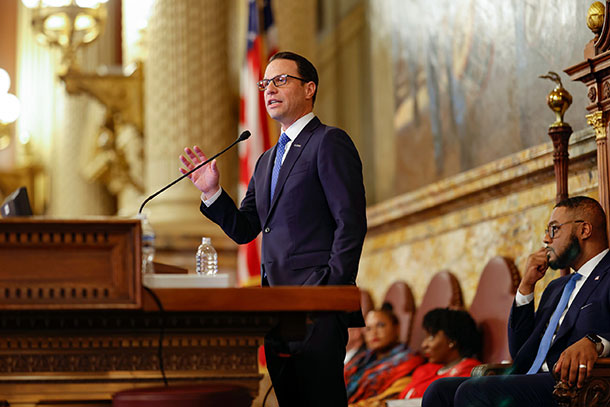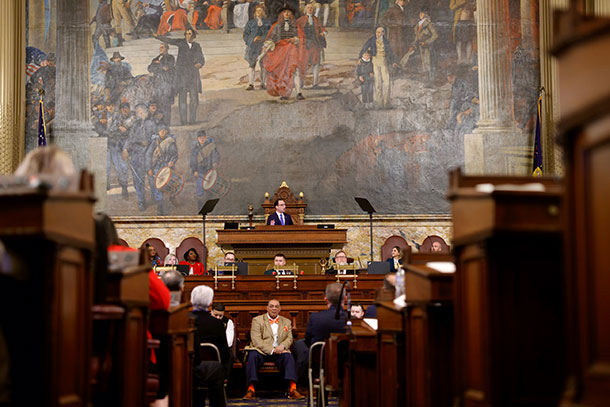News & Politics
5 takeaways from Josh Shapiro’s first budget address
Shapiro outlined a $44 billion budget that includes funding increases for education, policing.

Gov. Josh Shapiro during his first budget address to the Pennsylvania General Assembly. Commonwealth Media Services
In an 85-minute budget address that marked his first as the commonwealth’s top executive, Gov. Josh Shapiro laid out a $44.4 billion spending plan for the next fiscal year and outlined his vision for the first budget of his administration – a vision he said will require a collaborative, working relationship with the General Assembly where he once served.
“It takes 102 House members, 26 Senators, and one governor to accomplish anything. And as those numbers make clear, it requires a collective effort,” Shapiro said. “While we should hold firm to our individual values, that should not preclude us from opening up our minds and our hearts to one another to find common ground so that we can deliver the results the people of Pennsylvania deserve.”
Shapiro’s budget focuses heavily on workforce issues, policing and education – and seeks to deliver on several promises he made on the campaign trail last year. If enacted as presented to lawmakers, the spending plan would represent a 3.9% increase over last year’s $42.7 billion General Fund budget, according to Shapiro administration officials.
The governor’s budget address, made before a joint session of the General Assembly in Harrisburg, kickstarts a months-long budget process that will likely present some challenges for the first-term governor.

Not only will Shapiro and lawmakers have to iron out a solution to how to fix the state’s public school funding system, but they’ll also need to chart a path through an anticipated structural budget deficit over the next several years.
Below, City & State takes a look at some of the highlights from Shapiro’s budget address, and how lawmakers reacted to the release of the Democratic governor’s first budget proposal.
Education funding remains in the spotlight
Former Gov. Tom Wolf may have campaigned as an “education governor,” but his successor will have his work cut out for him when it comes to determining how best to direct funding to Pennsylvania schools.
Shapiro’s budget address comes on the heels of a historic decision from the state’s Commonwealth Court, which ruled that Pennsylvania’s existing public school funding system does not meet the constitutional rights of students.
His budget package recommends putting an additional $567.4 million through the state’s Fair Funding Formula, a $103.8 million increase in special education funding, and a $30 million increase for the state’s Pre-K Counts program.
The budget also proposes using $38.5 million in state funds to continue a universal free breakfast program that was made possible through federal COVID-19 aid. Additionally, the spending plan recommends $100 million for improvements and remediation efforts to school buildings.
And looming over all things education is the Commonwealth Court decision, which lawmakers on both sides of the aisle said represents an opportunity to reform the state’s system of education.
“We need to seize this moment to transform the reality for the people of Pennsylvania,” said state Sen. Vincent Hughes, the minority chair of the Senate Appropriations Committee. “It’s time, once and for all, to deal with this issue.”
A structural deficit looms
Another challenge awaits Shapiro in the form of a structural budget deficit.
Shapiro administration officials said Tuesday that the commonwealth will face a deficit over the next five years, where General Fund expenditures will outpace revenue, and that the administration’s five-year budgeting outlook takes that into account.
Officials from the administration said that the state will likely have to take money from the state’s Rainy Day Fund to cover the gap. The fund currently stands at $5 billion, per the Pennsylvania Treasury.
Republicans expressed concern about the level of spending in the proposed budget, particularly with a structural deficit looming.
“Instead of proposing a spending plan which addresses the structural deficit, the governor proposes to spend our $11 billion in surplus and Rainy Day funds – which are one-time revenue sources – over five fiscal years on recurring revenue,” said state Rep. Seth Grove, the minority chair of the House Appropriations Committee.

“The House Republican caucus led efforts to build this reserve fund for economic downturns and it is not raining,” Grove said, adding that the budget would put the state on the path of “financial failure.”
Shapiro noted during his speech that his administration’s projections are more conservative than those from the state’s Independent Fiscal Office, which predicted last year that the commonwealth’s structural deficit will hit $3.1 billion in FY 2027-2028.
Funding the police
It looks like there will be no defunding of the police on Shapiro’s watch.
The governor is proposing a new “Public Safety and Protection Fund” designed to end the state’s long-standing fund transfers from the Motor License Fund to the Pennsylvania State Police.
Shapiro is recommending a $36 million allocation for the new fund, including $16 million to fund four new State Police cadet classes. His budget also proposes $20 million to pay for replacement vehicles and helicopters for the State Police.
Shapiro also wants to extend the state’s 911 surcharge, which is currently set to expire in 2024. There are calls for lawmakers to raise the surcharge from $1.65 to $2.03 – a rate increase that Shapiro administration officials said was a top priority for the state’s county commissioners and will ensure that 911 services will continue.
Shapiro also formally unveiled his plan to use $24.7 million to create a tax credit program to recruit more nurses, teachers and police officers to the state. The program would provide credits of up to $2,500 per year to eligible recipients if ultimately approved by lawmakers.
From the campaign trail to the Capitol
Shapiro spent the last year crisscrossing the state on the campaign trail, and several of his campaign promises reemerged in his first budget proposal.
Included in the budget plan is a measure to eliminate the state’s taxes on cell phones, which he campaigned on last year. The budget proposal also includes an expansion of the state’s Property Tax/Rent Rebate Program, which provides rebates to Pennsylvanians above the age of 65, widows and widowers and people with disabilities.
Shapiro is proposing expanding the income caps on the program, which would make an additional 173,000 Pennsylvanians eligible for a rebate. Under the proposed expansion, rebate caps would also increase from $650 to $1,000.
There were also some campaign trail pledges that didn’t make it into the budget. Shapiro mentioned speeding up the decrease of the state’s Corporate Net Income Tax in his address, but his proposal does not include any policy recommendations that would quicken the existing timeline.
In reference to the state’s education dilemma, Shapiro said the Commonwealth Court decision has given the state “a once-in-a-lifetime opportunity for us to do right by our kids and to empower parents to put their kids in the best possible position for them to succeed.”
But while Shapiro spoke of empowering parents, his stance on a proposal to create “Lifeline Scholarships” for students in low-achieving school districts is less clear, with no mention made of the plan, which he expressed support for last year.
Another big test: A divided state legislature
Shapiro struck a collegial tone on Tuesday – his first time back at the rostrum since 2011, when he gave his farewell address as a member of the Pennsylvania House of Representatives.
That’s not to say there weren’t areas of disagreement: Republicans pushed back against certain components of Shapiro’s budget, including the inclusion of anticipated revenue from the state’s entrance into the Regional Greenhouse Gas Initiative, which is currently held up in court.
The absence of the Lifeline Scholarship proposal also irked some Republicans, but Shapiro’s tone ultimately seemed to resonate, as the mood inside the Capitol after his speech was more relaxed than in past budget cycles.
“It was really good to see this year’s budget address wasn’t as ideological as they have been in past years,” said Kim Ward, the state Senate’s top-ranking Republican. “The governor said a lot of things that we can all get on board with; we just need to find out how we’re going to pay for those things.”
Democrats also welcomed Shapiro’s approach. “I heard the governor who gets it, who understands because of the experiences he’s had,” said state Sen. Judy Schwank, a Democrat from Berks County. “He’s been in the legislature. He’s been a county commissioner. He gets it in terms of what the people of Pennsylvania – real people – are facing.”
And if his lengthy speech on Tuesday was any indication, Shapiro is looking forward to the challenges ahead of him.
The people of Pennsylvania, Shapiro said, “have entrusted us with the responsibility to negotiate, to come together. Instead of playing politics as usual, let’s show the good people of Pennsylvania that we are up to this task.”
